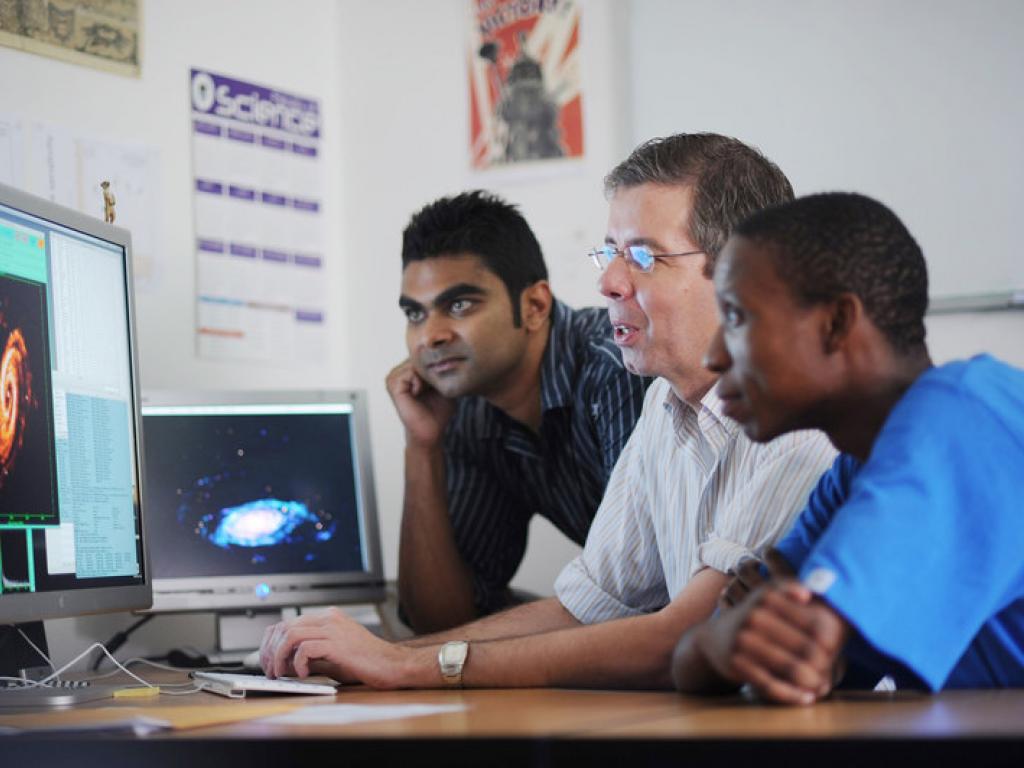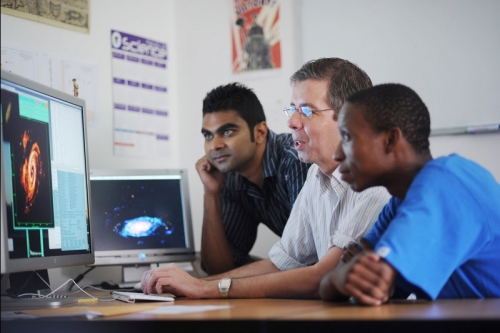Honorary prof awarded sought-after ERC grant


Prof Erwin de Blok (middle) has been awarded a highly sought-after ERC Advanced Grant.
Former South African Research Chairs Initiative (SARChI) chairholder and current Honorary Professor of Astronomy at the University of Cape Town (UCT) Professor Erwin de Blok has been awarded a highly sought-after European Research Council (ERC) Advanced Grant.
The five-year, €2.5 million (around R50 million) grant was awarded to De Blok based on the scientific excellence of the project he proposed, namely “MeerGas: Finding the origin of gas in galaxies with the MeerKAT”.
The precursor to the Square Kilometre Array (SKA) radio telescope in South Africa, MeerKAT consists of 64 antennas in the Northern Cape. While fulfilling the role of SARChI chairholder in astronomy at UCT between 2007 and 2011, De Blok became involved in the early planning of MeerKAT and has also contributed significantly to the development of the SKA.
Although De Blok is currently employed full-time as a researcher for ASTRON, the Netherlands Institute for Radio Astronomy, his scientific ties with South Africa have remained strong due to his involvement with the MeerKAT and SKA.
Tough competition
The ERC Advanced Grant is the largest individual research grant awarded by the European Union (EU) – through the European Research Council – and, therefore, highly sought after by researchers spanning the full spectrum of sciences at institutions throughout the EU.
Each year the ERC receives about 2 000 applications, but in the end only 180 to 200 of these projects receive funding. Typically, only about 10 of these are astronomy related.
Applications are put through a stringent three-part approval process, including two separate committees and a group of eight anonymous experts.
“Only if all parties involved are convinced of the excellence of a project, does it receive funding.”
“Only if all parties involved are convinced of the excellence of a project, does it receive funding,” De Blok said.
His MeerGas project is still in its commissioning phase but will commence later this year and run for five years.
The grant will enable De Blok to dedicate a significant portion of time to MeerGas and, more importantly, enable him to hire a number of postdoctoral researchers and PhD students who will be working on the project full-time.
“Given the strong South African connections, I hope that some of these will come from South Africa,” he said. “But even if they don’t, they will still spend a significant part of their time at UCT or SARAO [South African Radio Astronomy Observatory] to work with the MeerKAT team and the UCT astronomers.”
Searching for gas in other galaxies
The observations for MeerGas will be provided by the MeerKAT Observations of Nearby Galactic Objects – Observing Southern Emitters (MHONGOOSE) project, of which De Blok is also the principle investigator.
The goal of the MHONGOOSE project is to conduct sensitive and detailed observations of the distribution of neutral hydrogen in other galaxies, which the investigators suspect is falling into these galaxies from intergalactic space.
“We think there must be gas falling into galaxies as the current amounts of gas that we see in galaxies are not large enough to sustain star formation for more than a fraction of the lifetime of the universe,” De Blok explained. “So, this infalling gas is needed to ensure that galaxies can keep forming stars over their lifetime.”
This infalling gas is, however, in a form that is so difficult to detect that it requires observations a few hundred times more sensitive than any conducted previously.
“Essentially the people in the MeerGas project will form the core of a team that will do the day-to-day data analysis with the wider MHONGOOSE team contributing with scientific knowledge, expertise and additional data from other telescopes,” said De Blok.
Maintaining a connection to UCT
Upon his return to the Netherlands in 2012, the Department of Astronomy at UCT offered De Blok an honorary professorship to retain their professional relationship well into the future.
“Many UCT staff and students have been involved in the design of the MHONGOOSE project, and some of them are still part of that team,” De Blok said. “[As mentioned earlier], when MeerGas starts later this year, I hope to have many UCT people involved again.”
While the ERC Advanced Grant is certainly a feather in De Blok’s cap, it no doubt also proves that astronomy remains an important field of research and one young scientists should be encouraged to pursue.
De Blok, who has nurtured his passion for galaxies and all they contain since childhood, said that learning about the universe and how it works on such a grand scale is truly exciting. However, on a more practical note, it also teaches researchers to efficiently extract small nuggets of important information from massive data sets.
“One shouldn’t underestimate astronomy’s contribution to innovation and education in society.”
